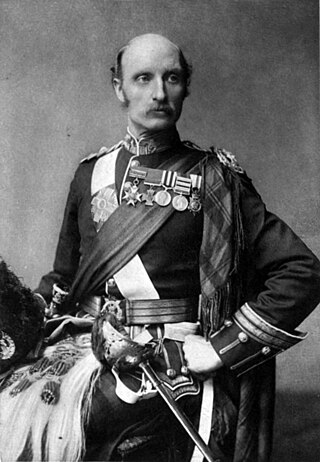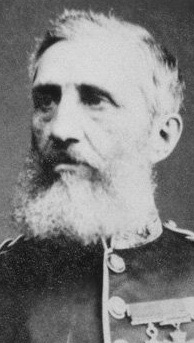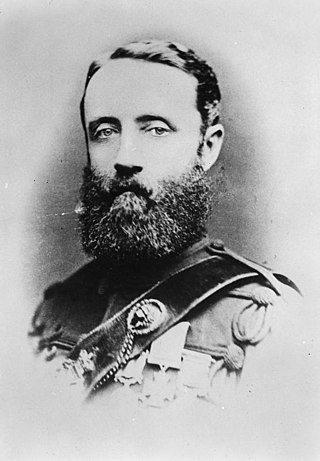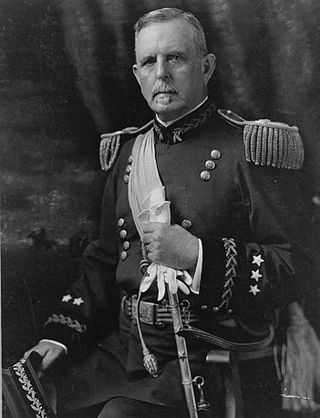Related Research Articles

General James Blair was a Scottish recipient of the Victoria Cross (VC), the highest and most prestigious award for gallantry in the face of the enemy that can be awarded to members of British and Commonwealth forces.

Lieutenant Colonel Abraham Boulger VC was an Irish recipient of the Victoria Cross, the highest and most prestigious award for gallantry in the face of the enemy that can be awarded to British and Commonwealth forces.

Colonel Richard Wadeson VC was an English recipient of the Victoria Cross, the highest and most prestigious award for gallantry in the face of the enemy that can be awarded to British and Commonwealth forces.

Field Marshal Sir George Stuart White, was an officer of the British Army. He was stationed at Peshawar during the Indian Mutiny and then fought at the Battle of Charasiab in October 1879 and at the Battle of Kandahar in September 1880 during the Second Anglo-Afghan War. For his bravery during these two battles, he was awarded the Victoria Cross. He went on to command a brigade during the Third Anglo-Burmese War in 1886 and became commander of Quetta District in 1889 in which role he led operations in the Zhob Valley and in Balochistan. He was commander of the forces in Natal at the opening of the Second Boer War and fought at the Battle of Elandslaagte in October 1899. He commanded the garrison at the siege of Ladysmith: although instructed by General Sir Redvers Buller to surrender the garrison he responded "I hold Ladysmith for the Queen" and held out for another four months before being relieved in February 1900. He finished his career as Governor of Gibraltar and then as Governor of the Royal Hospital Chelsea.

General James Travers was an Irish recipient of the Victoria Cross, the highest and most prestigious award for gallantry in the face of the enemy that can be awarded to British and Commonwealth forces.

Lieutenant General James John McLeod Innes was a Scottish recipient of the Victoria Cross, the highest and most prestigious award for gallantry in the face of the enemy that can be awarded to British and Commonwealth forces.

Major General Donald Macintyre was a Scottish recipient of the Victoria Cross, the highest and most prestigious award for gallantry in the face of the enemy that can be awarded to British and Commonwealth forces.
Colonel William George Cubitt, was a senior officer in the British Indian Army and a recipient of the Victoria Cross, the highest award for gallantry in the face of the enemy that can be awarded to British and Commonwealth forces.

Lieutenant-General Sir Herbert Taylor Macpherson was a Scottish recipient of the Victoria Cross, the highest and most prestigious award for gallantry in the face of the enemy that can be awarded to British and Commonwealth forces.

Field Marshal Sir Henry Wylie Norman, was a senior Indian Army officer and colonial administrator. He served in the Second Anglo-Sikh War, the campaign against the Kohat Pass Afridis, the suppression of the Santhal rebellion, and the suppression of the Indian Mutiny. He became military member of the Viceroy's Council in 1870, in which role he maintained the policy of ensuring that the Indian Army were less well armed than British troops there to deter another mutiny. As a result, he became a member of the Council of India; and in his later years he became Governor of Jamaica and then Governor of Queensland.
Major-General Frederick Edward Hadow. He is notable for having served during the Indian mutiny and is believed to have been a senior Officer in the Hyderabad Contingency Force.

General Sir Baker Creed Russell was an Australian-born British Army officer who served with distinction in the Indian Mutiny, Anglo-Ashanti War, Anglo-Zulu War, Sekhukhune Wars, and Egyptian War
Sir Edmund Hope Verney, 3rd Baronet FRGS, DL, JP was a British naval officer, author and Liberal politician who sat in the House of Commons in two periods between 1885 and 1891.

Henry Clark Corbin was an officer in the United States Army who served as Adjutant General of the U.S. Army from 1898 to 1904.
Lieutenant general Sir Charles Edward Nairne was a British military officer who served in British India.
Major-General Sir Isaac Campbell Coffin was an officer of the East India Company's military service who served during the company's rule in India, the First Anglo-Burmese War and the Indian Mutiny. He rose to the rank of major-general after a long career in India.

General Sir Richard Chambré Hayes Taylor was a senior British Army officer who served in the Second Anglo-Burmese War, the Crimean War and the Indian Mutiny. Joining the General Staff in 1860, he was the British Army's Inspector General of Recruiting, then Deputy Adjutant-General to the Forces, briefly Adjutant-General, and finally for three years Governor of the Royal Military College, Sandhurst. He was also Colonel of the Queen's Own Cameron Highlanders and the East Surrey Regiment.
General Sir John Ross was a soldier of the British Army and the Bengal Army who fought in the Crimean War and the Indian Mutiny and later commanded British forces in Canada.
Major-General George Elphinstone Erskine (1841-1912) was a senior British Indian Army officer who served in India during the Indian Mutiny in 1857.
General Clarke may refer to: